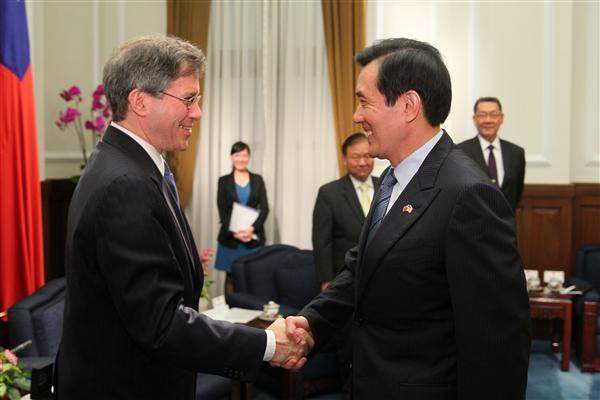News & activities
 News releases
News releases
President Ma Ying-jeou met on the afternoon of July 25 with Professor Paul Gewirtz, director of Yale Law School's China Law Center. After welcoming Professor Gewirtz to Taiwan, the president exchanged opinions with his guest on Taiwan's legal system as well as its foreign affairs and cross-strait policies.
In remarks, President Ma noted that Professor Gewirtz has long focused on the development of constitutional law around the world, as well as legal education and judicial reform. The professor, the president said, is a renowned expert in the United States on constitutional law and mainland Chinese law, and is well-known throughout the Chinese and global academic community. Professor Gewirtz established the China Law Center at Yale in 1999, and President Ma expressed admiration for the center's active promotion of judicial reform in mainland China.
The president stated that the formal implementation of the Constitution of the ROC in 1947 ushered in constitutional government and a democratic political system. Two years after the constitution took effect, however, the Chinese Civil War (1927-1937; 1945-1949) led to the temporary suspension of the constitution and replacement by the Temporary Provisions Effective During the Period of National Mobilization for Suppression of the Communist Rebellion taking precedence, he said. It was not until 1991, when the government ended the Period of Communist Rebellion and abolished the temporary provisions, that the nation returned to a constitutional system.
President Ma further stated that in recent years the ROC has aggressively pushed judicial reform and is currently in the process of promoting an advisory jury system, thereby offering the opportunity for the public to participate in trials. The president cited a public opinion survey carried out last year that indicated 81% of the public feels that an advisory jury system would boost public trust in the judiciary. The government, he said, also hopes that this system will enable the public to provide opinions to judges that can be used for reference and also help the public to better understand and trust the law by taking part in the trial process.
The president explained that the ROC, since losing its seat at the United Nations (UN) in 1971, has been unable to take part in UN activities. However, the nation has taken steps to incorporate important international covenants, such as the International Covenant on Civil and Political Rights and the International Covenant on Economic, Social and Cultural Rights, into national law. He said that an enforcement law has been enacted and that domestic courts are using the covenants as the basis for judicial decisions, thereby providing greater human rights protections to the public here.
As for Taiwan-US relations, the president mentioned, this year marks the 35th anniversary of the passage of the Taiwan Relations Act, which represents a new milestone for relations between the two sides. He added that weaponry the United States has sold to Taiwan is gradually being delivered, thus boosting Taiwan's defense capability. In the area of cultural ties, the president said, the United States formally included Taiwan in its Visa Waiver Program in November 2012, which has led to greater interaction between the people of both nations. These developments show that bilateral relations are progressing very well, he remarked.
President Ma also mentioned that cross-strait relations are presently at their best state in over 60 years. He said that since he took office in 2008 the two sides have signed 21 agreements and reached consensus on two issues. Of these, he noted, the Cross-Strait Joint Crime-Fighting and Judicial Mutual Assistance Agreement has enabled both sides to work together in combatting crime and capturing over 6,000 criminals. This prevents mainland China from serving as a sanctuary for criminals from Taiwan anymore, the president said.
President Ma then explained that Taiwan is actively playing the role of "regional peacemaker" and "provider of humanitarian aid" in the international community. In terms of maintaining peace in the region, Taiwan introduced its East China Sea Peace Initiative in August 2012 and acted upon the spirit of the agreement in April of last year by signing a fisheries agreement with Japan, under which the two sides decided to shelve but not relinquish their sovereignty claims over the Diaoyutai Islets, and Taiwan's fishermen obtained rights to fish in an expanded area near the Diaoyutais—an area which is now double the size of Taiwan. This has increased their catch, he said, adding that fishing disputes between the two sides has fallen from 17 in the year prior to the signing of the agreement to just one last year. Meanwhile, he stated, Taiwan and Okinawa have also reached a consensus to have their fishing boats operate at different times, thereby effectively reducing the likelihood of disputes. This peaceful way of resolving disputes over fishing grounds has been applauded by the international community, he said.
Lastly, the president discussed humanitarian aid, saying that the government and people of Taiwan provided donations to Japan after the Great East Japan Earthquake of March 2011. In just two short months, over US$200 million was raised here for the relief efforts, which set a new high. In addition, he pointed out, Taiwan was the first on the scene to distribute rescue and relief goods to the Philippines after that nation was hit hard by Typhoon Haiyan in November of last year. Taiwan provided US$12 million worth of relief aid in that case, he said. Both are substantive examples of Taiwan serving as a "provider of humanitarian aid," the president remarked.



